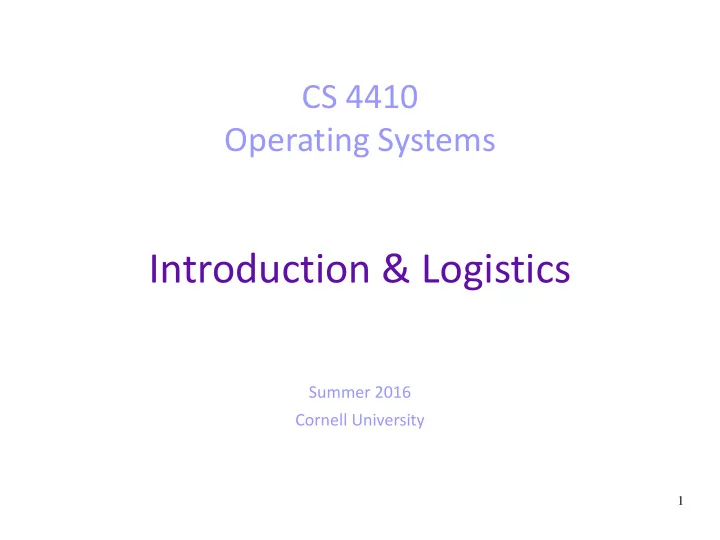

CS 4410 Operating Systems Introduction & Logistics Summer 2016 Cornell University 1
Welcome! 2
Welcome! 3
Why are we here? 4
Applications Web-browser Word Processor Video Game Hardware CPU Memory Disk Network card Monitor 5
Why do we need Operating Systems? Applications Web-browser Word Processor Video Game • To manage HW resources for applications. • To provide abstractions of HW resources to applications. Hardware CPU Memory Disk Network card Monitor 6
Why learn Operating Systems? ● Apply OS ideas to other contexts. ● Better understanding of computer systems. ● Learn open problems. 7
What is an Operating System? ● A program that manages the computer hardware. ● An operating system (OS) provides an abstract interface on top of hardware that is more convenient than the raw hardware interface. 8
What is an Operating System? Users Mary John Applications Web-browser Word Processor Video Game Operating System Scheduler Monitor Driver Network Driver Memory manager Disk manager Hardware CPU Memory Disk Network card Monitor 9
Operating systems may be huge (> 50 million lines), ??? but they are based on simple, intuitive ideas . 10
An OS exists in: ● Personal computer ● Smartphone ● Wearable devices ● Car ● Servers ● MRI machines ● … 11
A modern OS exists in: ● Personal computer ● Smartphone ● Wearable devices ● Car ● Servers But not everywhere! ● MRI machines • It is not always needed. ● … • It is not always reliable enough. 12
Evolution of OS Support for: One program at a time. Time Multiple programs at the same time. Interactivity with the user. From 9 operating systems in 1950s to ~350 operating systems in 2010s! ??? 13
In this course, we will learn how an OS: ● enables interaction between user and hardware, ● manages hardware resources, focusing on: – processor, – memory , – storage, and – network. 14
References ● http://sigops.org/sosp/sosp15/history/ ● http://denninginstitute.com/pjd/GP/GP- site/welcome.html ● https://ecommons.cornell.edu/handle/1813/4 0564 15
Logistics Webpage: http://www.cs.cornell.edu/courses/CS4410/2016su/ ● Instructor: Elisavet Kozyri ● Teaching Assistant: Kevin Sekniqi ● Office hours: Every day! Great for answering questions! ● Email: For short clarifications. ● Prerequisites: ● Programming experience ● Computer architecture: CS3410/ECE3140 ● 16
Logistics Course Objectives: ● Emphasis on ideas, not on technical details. ● We will not build an operating system. ● We will understand main principals used in most operating systems. ● Course format: ● Interactive lectures. ● Weekly assignments. ● Synchronized with lectures – Theoretical + practical – Individual and within deadlines! – Weekly in-class exams. ● 17
Logistics Final Exam ● August 16 th , Bard Hall 140 ● Course Reading ● Operating Systems: Principles and Practice ● Slides: become ready shortly before the corresponding lecture. ● Follow the schedule of the course on the webpage, for: ● slides, readings, and assigned exercises. ● CMS ● All students should have received an invitation. ● Class Attendance ● 18
Logistics Grading ● from A+ to F ● non-curved, approximately: ● – 10% at instructor's discretion (participation, etc) – 40% assignments – 20% in-class exams – 30% final exam Remember : The target is the knowledge, not the grade! ● Academic Integrity ● 19
Coming up: ● Tomorrow’s lecture: ● HW-OS and OS-App interface ● Get familiar with Python 2.7 ● HW1: ● Released tomorrow ● Due on Monday, 10pm ● No in-class exam for next week. ● First in-class exam on Monday, July 18 th . 20
Recommend
More recommend